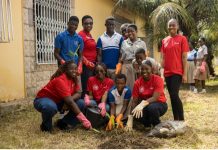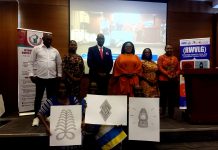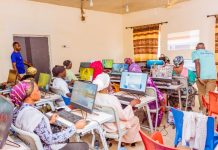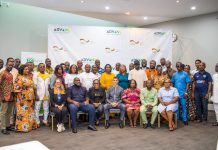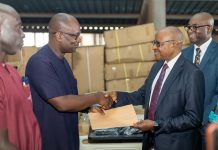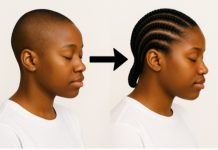LAGOS, Nigeria, June 10, 2022/ — Following a successful pilot phase in Nigeria, Dow expands its flexible packaging recycling initiative – Project REFLEX – into new markets in Africa (www.Dow.com); Post-consumer recyclate (PCR) produced during the pilot phase is being trialed by a large brand-owner for use in some of their packaging applications; Dow aims to divert 10,000 Metric Tons (MT) of flexible packaging waste by 2025 through Project REFLEX which supports Dow’s global commitment to help advance a circular economy for plastics and reduce plastic waste.
Dow (www.Dow.com/en-us) (NYSE: DOW) has announced the expansion of its Project REFLEX initiative in Egypt and Guinea, following a successful pilot phase in Nigeria. Working together with local partners the initiative aims to increase flexible packaging recycling in Africa to establish a market for recycled contents to help address the waste issue while providing job opportunities for local communities.
The project, which launched in 2020 (https://dow.inc/3ObOLRL), specifically targets flexible packaging such as plastic water sachets that ensure local communities have access to clean water, to show that it can be collected and recycled to be used in new, quality packaging applications.
The post-consumer recyclate (PCR) that was created in the pilot phase is currently being trialed by a large brand owner for use in some of their non-food packaging applications. If successful, this will be a live example of a closed-loop system for plastics in Africa and prove further the commercial viability of PCR materials from flexible packaging waste.
Through Project REFLEX, Dow aims to divert 10,000 Metric Tons (MT) of flexible packaging waste by 2025 which would otherwise end up in landfill or the environment, while also creating direct employment opportunities for over 50,000 waste collectors in Nigeria, Egypt and Guinea through dedicated innovative waste management company, Wecyclers. So far, the Project has diverted a total of 520 MTs of flexible packaging waste into mechanical recycling streams and new applications.
Sami Mainich, Regional Director Dow North & West Africa, commented: “At Dow, we know that a critical part of solving the plastics waste crisis is enabling a closed-loop system for waste. Using our expertise in materials science and technological capabilities, we believe that we are best placed to help accelerate the pace of change in developing nations like Africa by supporting innovative local enterprises to scale solutions that benefit the environment and local communities. The Project REFLEX initiative is a prime example of how this can take shape and grow sustainably especially where flexible packaging applications are concerned.”
Collaboration is Key: Expanding Project REFLEX into new markets in Africa
The expansion into Egypt began in December 2021 with Dow entering an 18-month partnership with the international non-governmental organisation, WasteAid (WasteAid.org), which shares waste management and recycling skills in lower- and middle-income countries, to advance plastic waste recovery and recycling in Aswan. The expansion strategy for Project REFLEX will see similar partnerships with public, private and community-level actors in Egypt and Guinea to increase the collection and valorization of flexible plastic.
Olawale Adebiyi, CEO of Wecyclers said: “Through working alongside large supporters like Dow to scale sustainable solutions in tackling flexible packaging waste in Africa, we can help ensure this material retains its value. It has been both rewarding and inspiring to see the positive impact of these combined efforts on Nigeria’s local business communities through the pilot phase of Project REFLEX. We look forward to extending our role in Egypt and Guinea, helping to raise awareness of the socio-economic benefits of sustainable waste management.”
Socio-economic Focus: Helping to stop the waste and support local communities
The project has a strong socio-economic focus, so in addition to providing expertise, funding and technology to bolster efforts to divert plastics waste from the environment, Dow and Wecyclers want to ensure that local communities in Africa are aware of the value these materials have and the income opportunities they can provide through collection, sorting and recycling.
For example, the organisations ran an event in March in partnership with a social impact organization bringing together members of the community and local organisations to learn more about plastics recycling and actively take part in a clean-up exercise in Lagos Island, Lagos, kicking off a grassroots campaign to ensure more people collect and bring back their plastic water sachets.
Adwoa Coleman, Dow’s Africa Sustainability and Advocacy Manager for Packaging and Specialty Plastics said: “The reason we are so proud of Project REFLEX in Africa is that it addresses the full lifecycle of flexible plastic packaging – from production right through to use. Our hope is that the education, materials and support to the local communities and businesses in Nigeria, Egypt and Guinea, and potentially other African markets, received through the programme will result in long term sustainable collection for flexible packaging. At Dow, we see a circular economy thriving in the region if it is inclusive of the people who are already doing this hard work on the ground to enable it and that is exactly what we are trying to do through Project REFLEX in Africa.”
By collaborating with individuals and organizations that are already supporting waste management infrastructure and recycling, Project REFLEX is driving and scaling local, sustainable solutions for Nigeria, Egypt and Guinea. This project is aligned to Dow’s global STOP THE WASTE (https://dow.inc/39dI9U9) sustainability target which will enable the collection, reuse or recycling of one million metric tons of plastic globally by 2030.
The funding for Project REFLEX comes from Dow’s Business Impact Fund (https://dow.inc/3HcqJ6F) , a competitive grant program that allocates corporate contributions toward shared value projects to help address social problems through the Company’s technology and expertise.
For more information, please visit: www.Dow.com
About Dow:
Dow (NYSE: DOW) combines global breadth; asset integration and scale; focused innovation and materials science expertise; leading business positions; and environmental, social and governance (ESG) leadership to achieve profitable growth and deliver a sustainable future. The Company’s ambition is to become the most innovative, customer-centric, inclusive, and sustainable materials science company in the world.
Dow’s portfolio of plastics, industrial intermediates, coatings and silicones businesses delivers a broad range of differentiated, science-based products and solutions for its customers in high-growth market segments, such as packaging, infrastructure, mobility and consumer applications.
Dow operates 104 manufacturing sites in 31 countries and employs approximately 35,700 people. Dow delivered sales of approximately $55 billion in 2021. References to Dow or the Company mean Dow Inc. and its subsidiaries. For more information, please visit www.Dow.com or follow @DowNewsroom (https://bit.ly/3xh2Czj) on Twitter.
About Wecyclers:
Wecyclers offers convenient household recycling services using a variety of low-cost collections methods. The company is powering social change by empowering people in low-income communities to capture value from their waste. The company’s model solves the urban waste challenge for households and recyclers. Wecyclers is able to offer convenient household recycling service in densely populated low-income neighbourhoods.
Wecyclers works in partnership with the Lagos Waste Management Authority (LAWMA) and collects recyclable waste, including plastic bottles, plastic bags, and aluminium cans, at the household level. Subscribers and households are rewarded with redeemable points based on the volume and quality of recyclables that they supply.
Wecyclers services over 25,000 households and has diverted over 10,000 tons of recyclables from landfills and the ocean into productive reuse. For more information, please visit www.Wecyclers.com.



